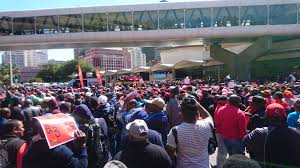Nothing reveals more clearly the destructive motives of many South Africa trade unions than their furious opposition to the law passed this month making compulsory a secret ballot of all workers for deciding on a strike. The secret ballot takes power from the trade bosses and labour activists and gives it to the workers. This is why it is so hated by the bullies and so welcomed by democrats.
I worked on shifts at a mill in Lancashire, England, in the late 1970s and early 1980s, and saw for myself how a small minority of trade union activists can force decisions against the wishes of the majority of the workers. On one occasion the owners offered the employees a very generous annual pay rise. Every worker I spoke to was delighted with it and wanted to accept. Then the union bosses did an open paper ballot among the workers. The offer was rejected overwhelmingly. I was puzzled but an experienced operator explained to me what had happened. The trade union bosses and the factory shop stewards, neither of whom cared much about the welfare of the workers, wanted rejection to advance their reputations for militancy, to further their anti-capitalist ideology and to outbid competing trade unions (trade union rivalry was a cancer in the British workplace). They drew up blank lists with two columns, “accept” and “reject”. The union officials all entered their own names under “reject”. Then, as a group, they approached the weakest worker in the factor, showed him the list and said to him: “Are you with the lads or with the bosses?” He signed his name under reject. Then to the next weakest worker, and the next. Eventually there was a long list of names under “reject” and none under “accept”. In the end everybody was intimidated into “reject”. If the question is whether to go on strike or not rather than whether to accept an offer or not, intimidation by a minority of bullies and militants is even worse, and with an open show of hands worse still.
When Margaret Thatcher came to power in 1979, she made the secret ballot legally compulsory for strikes. She did not “crush the trade unions”, she democratised them. She took power from the hands of the minority and gave it to the majority of workers, so reducing destructive strikes and increasing industrial harmony. Endless strikes and excessive power in the hands of trade union bosses had been ruining British industry before she arrived. The motor car industry was particularly hard it. After her reforms, the Japanese set up a huge Nissan factory in Sunderland in the north east of England. It was highly successful, with excellent labour relations and became one of the most productive car factories in the world. (The Japanese also insisted on a revolutionary industrial policy for the Nissan plant, namely one single trade union for the whole plant. This prevented the crippling inter-union strife.)
The South Africa trade unions played a brave, constructive and vitally important part in the fight against apartheid. The formal recognition of the black trade unions in 1979 was one of the two great milestones in the road to ending it. (The ending of the Pass Laws in 1986 was the other.) They provided a crucial means of official communication between the white National Party Government and the black majority of people. Since 1994, their record has been almost entirely destructive, helping to cripple South Africa’s economy, end industrialisation, deter investment and worsen our disastrous unemployment. Strikes have been increasing since about 2011, and are often violent, with massive intimidation and even considerable loss of life. There is no evidence that the majority of workers support many of these strikes. Most suffer badly because of them with disrupted lives, loss of income and increased chances of factory closures. The union bosses, who get paid throughout the strikes, experience no such suffering. Excessive power in the hands of the union leaders is worsened by the fact that Cosatu (Congress of SA Trade Unions) and the Communist Party are in alliance with the ANC government.
Acceptance of the secret ballot at Nedlac (National Economic Development and Labour Council) seems to have been the price it had to pay for accepting the ruinous Minimum Wage. Passed by rich people on behalf of rich people, the Minimum Wage, increases poverty, inequality and unemployment. A poor black employer is not allowed to offer a poor black worker the only salary he can afford if it is below the minimum wage – even if the worker would be delighted to accept it. So the black employer goes out of business and the black worker goes hungry. Only the rich (usually white) are allowed to be employers. Such is the malevolent effect of the Minimum Wage. But the adoption of the compulsory secret ballot is some consolation.
Andrew Kenny is a writer, engineer and classical liberal

